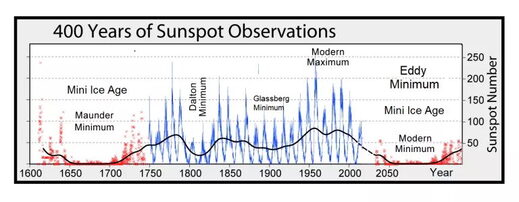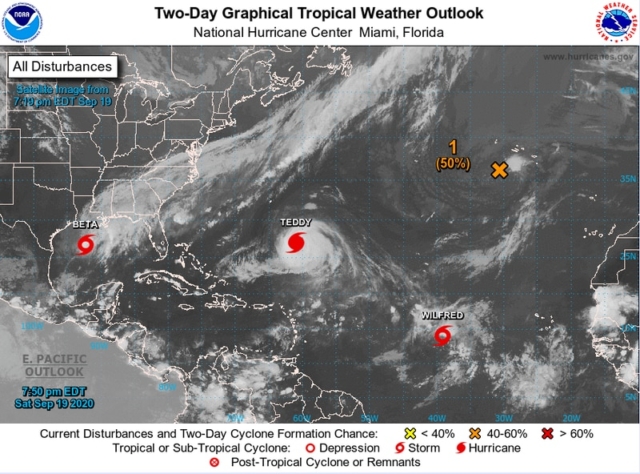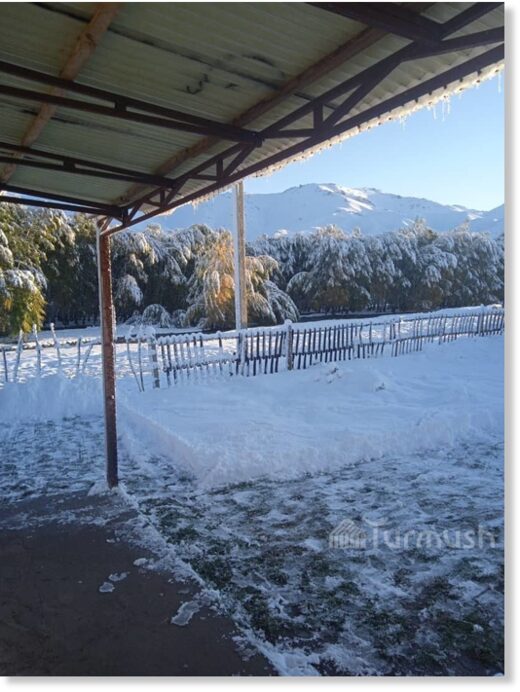Their press releases surely won't admit it, but NOAA's PREDICTED SUNSPOT NUMBER AND RADIO FLUX data appears to show a 'full-blown' Grand Solar Minimum running from the late-2020s to at least the 2040s.
NOAA (who's solar forecasts generally come out higher than NASA's) say it won't be until mid-2025 before we see the peak of the next Solar Cycle (25), with the maximum topping out at 114.6 sunspots:
NOAA predicts Solar Cycle 25 will max out at 114.6 sunspots in July, 2025 (note this is far higher than NASA’s official prediction of around 30 to 40 sunspots).
NOAA's forecast then begins to plot the descent into the minimum of Cycle 25 from mid-2025 to 2031-or-thereabouts; and while all this paints Solar Cycle 25 as another historically weak cycle (one similar to 24 and which will continue the cooling trend), it
isn't the story here.
Minimum of Solar Cycle 25 should arrive around 2031.
The story is that NOAA aren't seeing the expected ramp-up into Cycle 26. When the sunspot number should be climbing back up, the agency's data (linked
here) reveals sunspots remain low, and actually continuing dropping:
NOAA is predicting
all-but ZERO sunspots throughout the 2030s:
There is no ramp-up into Solar Cycle 26.
THERE IS NO SOLAR CYCLE 26!
Nor are there any signs of the start of Solar Cycle 27: the data
only runs through the year 2040, but within those final twelve months a SPOTLESS sun persists:
NOAA is predicting a 'full-blown' Grand Solar Minimum (GSM).
GSM's have the potential to hold sunspots at ZERO for multiple decades. The most famous example is the
Maunder Minimum (1645-1715) which brought plummeting temperatures, crop loss, famine, and the deaths of hundreds of millions of people ACROSS the planet.
Unfortunately, history repeats — climate is cyclic, never linear. But unlike during the Maunder Minimum, there's a twist this time around; we modern humans have another cosmological factor to contend with: Earth's
magnetosphere -a key line of defense against incoming Cosmic Rays- is waning at an increasing rate as north and south magnetic poles continue their wander.
The field is expected to be considerably weaker by 2040, and, as with previous magnetic excursions/reversals, these events can lead to an uptick in volcanic/seismic activity, solar outbursts, and even the onset of ice ages.
These two
independent factors occurring simultaneously -
-a Grand Solar Minimum AND a Pole Shift- are throwing us something of a curve-ball. Each factor alone results in a dramatic waning of earth's magnetosphere, the upshot of which is more Cosmic Rays entering our atmosphere nucleating clouds, sending volcanoes a'poppin', cooling the planet, and affecting biology.
Modern civilization is entering unprecedented times.
Prepare.
For those out there who feel that "
something is coming" -- well, perhaps a Grand Solar Minimum is that something. We humans are programmed to recognize cycles -them having been ingrained within us during our evolution- and the activity of the cosmos runs like a clock.
The
COLD TIMES are returning, the mid-latitudes are
REFREEZING; in line with
historically low solar activity,
cloud-nucleating Cosmic Rays, and a
meridional jet stream flow.
And as well as NOAA, NASA also appears to agree,
if you read between the lines, with their forecast for this upcoming solar cycle
(25) seeing it as "
the weakest of the past 200 years," with the agency correlating previous solar shutdowns to prolonged periods of global cooling
here.
Prepare for the COLD —
learn the facts, relocate if need be, and grow your own.
Social Media channels are restricting Electroverse's reach — Twitter are purging followers, and Facebook are labeling posts as "false". Be sure to subscribe to receive new post notifications by email
(the box is located in the sidebar >>> or scroll down if on mobile).
And/or become a Patron, by clicking here:
patreon.com/join/electroverse, and/or consider "allowing ads" for
www.electroverse.net if you use a blocker.
The site receives ZERO funding, and never has. So any way you can, help us spread the message so others can
survive and thrive in the coming times.

 The melt this year began at the average time, and the amount of melt was average."
The melt this year began at the average time, and the amount of melt was average." 






















